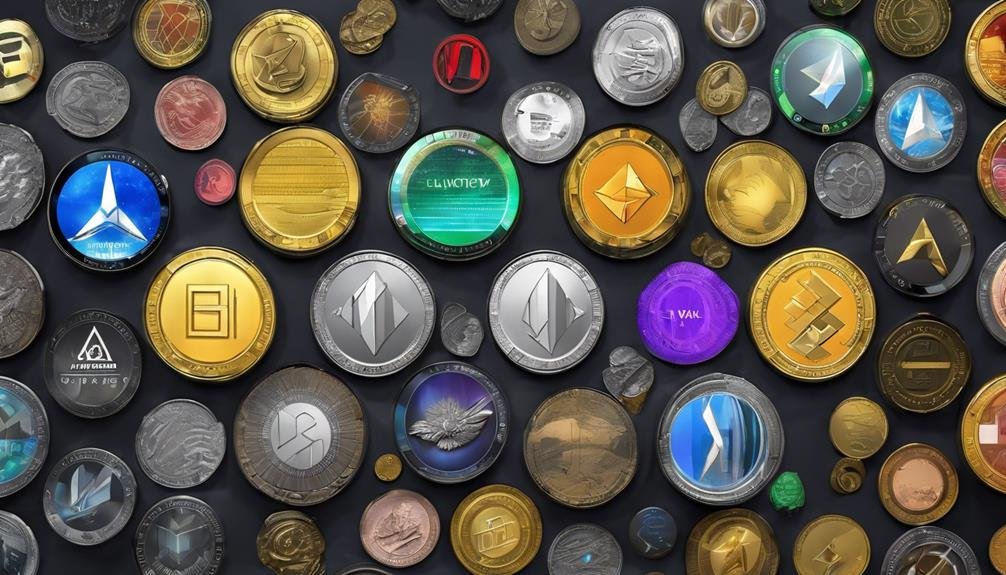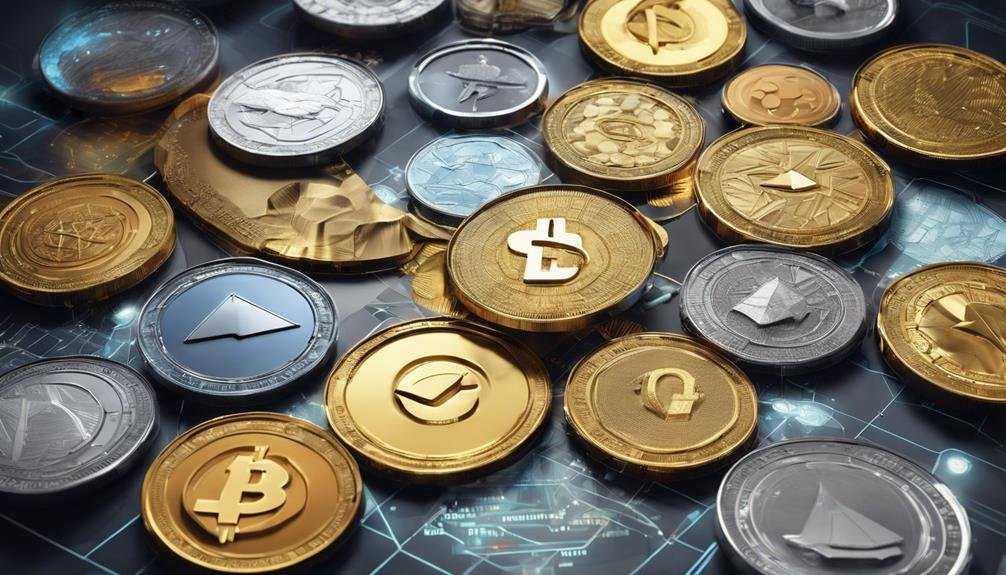When starting an altcoin investment, understanding market dynamics is essential. Factors like demand, tech progress, regulations, and investor sentiments impact prices. Research altcoin projects thoroughly by examining whitepapers, roadmaps, community engagement, and partnerships. Diversify your portfolio wisely to manage risks and capture trends. Engage in decentralized finance for better risk spread. Monitor and adjust allocations based on risk levels and growth potential. Explore top crypto news sites, social channels, and price charts, and attend conferences for insights. Stay informed about market trends and seek advice for solid long-term investing. Mastery of these tactics opens doors to successfully maneuvering the altcoin landscape.
Table of Contents
Brief Overview of Altcoin Investment Strategies For Beginners
- Research altcoin projects thoroughly for technology, team, and community insights.
- Diversify your altcoin portfolio to manage risk and benefit from market trends.
- Monitor market movements, technological advancements, and regulatory changes.
- Stay informed through reputable crypto news sources and engage in social media communities.
- Prioritize long-term investments in substantial projects, review portfolios, and avoid impulsive decisions.
Understanding Altcoin Market Movements
Understanding the driving forces behind price fluctuations is essential to maneuvering the volatile altcoin market successfully. Altcoin prices are not solely determined by random chance; they are heavily influenced by market demand, technological advancements, regulatory changes, and investor sentiment. Market demand plays a significant role in shaping the value of altcoins. When a particular altcoin garners attention and interest from investors, its price tends to rise due to increased demand. This dynamic presents a wealth of opportunities for growth and profit in the altcoin market.
Moreover, technological advancements within altcoin projects can lead to price surges as they demonstrate innovation and potential for growth. Regulatory changes also have a profound impact on altcoin prices. Positive regulatory developments can boost investor confidence, leading to higher prices, while unfavorable changes may have the opposite effect.
Lastly, investor sentiment plays a vital role in the altcoin market. Positive sentiment can drive prices up, while negative sentiment can cause sharp declines. Understanding these factors can help you make informed decisions when maneuvering the complex altcoin market landscape.
Conducting Research on Altcoin Projects

Traversing the volatile altcoin market successfully involves delving into thorough research on altcoin projects to make informed investment decisions. When evaluating an altcoin, start by scrutinizing its whitepaper for important information on technology, tokenomics, and the team driving the project forward. The roadmap provides insight into the altcoin’s future developments and critical milestones, aiding in understanding its growth trajectory. Additionally, evaluating the altcoin’s community engagement and social media presence can indicate active participation and support, which is essential for project success. This comprehensive research will empower you to make confident and informed investment decisions.
Partnerships are critical to an altcoin’s credibility and potential growth opportunities. Researching the altcoin’s affiliations with reputable organizations can provide valuable insights. To conclude, examining the altcoin’s historical performance, market capitalization, and trading volume offers a glimpse into its market position and potential for returns. You can make more informed decisions when exploring the diverse altcoin landscape by conducting thorough research encompassing these facets.
Diversifying Your Altcoin Portfolio

When diversifying your altcoin portfolio, you should focus on risk management strategies and portfolio allocation techniques. By spreading your investments across different types of altcoins, you can better position yourself to benefit from market trends and reduce potential losses. Consider factors like market cap, sector focus, technology, and the team behind the altcoin projects to build a well-rounded and resilient portfolio.
Risk Management Strategies
Consider diversifying your altcoin portfolio to mitigate risk and maximize potential returns. Investing in various altcoins within decentralized finance (DeFi) spreads your risk across different assets. Diversification involves holding altcoins with diverse use cases and functionalities, reducing the impact of market volatility on your overall investment. Allocate your funds across altcoins with varying market caps, technologies, and sectors to balance your risk exposure effectively.
This strategy can protect your portfolio from specific market events affecting individual coins, enhancing stability. Managing risk through diversification allows you to capture opportunities in different segments of the altcoin market while minimizing the impact of any asset’s performance. This approach will help you feel secure and reassured about your investments.
Portfolio Allocation Techniques
To diversify your altcoin portfolio effectively, strategically allocate different percentages of your investment capital to various altcoins based on their risk levels and growth potential. Diversifying investments across multiple altcoins helps reduce overall risk and maximize potential returns. When allocating your altcoin investments, consider factors like market trends, project team strength, technology, and market cap, which is the total value of all coins in circulation.
By spreading your investments, you can benefit from the growth of different altcoins while minimizing the impact of price fluctuations in any single altcoin. Additionally, periodic rebalancing of your altcoin portfolio is essential to maintaining your desired risk exposure and taking advantage of emerging opportunities in the market. Monitoring your portfolio regularly and adjusting your allocations to align with your investment goals is crucial for success.
Selecting a Secure Wallet for Altcoins

When selecting a secure wallet for your altcoins, consider wallet security features, backup and recovery options, and multi-currency support. These aspects are vital in safeguarding your investments and ensuring easy access to various altcoins. By prioritizing these points, you can protect your holdings and manage your portfolio efficiently.
Wallet Security Features
Seeking a secure wallet to store your altcoins? When choosing a wallet for your altcoin holdings, prioritize security features like multi-signature support, a feature that requires multiple private keys to authorize a transaction, hardware wallet integration, and two-factor authentication. Prioritize wallets with robust encryption protocols and essential private control to safeguard your investments from unauthorized access.
Consider wallets that value user privacy and data security by refraining from storing personal information or seed phrases on their servers. Opt for wallets that have undergone security audits and have a proven track record of securely storing altcoins to reduce the risk of potential hacks. It’s crucial to select wallets that offer backup options such as mnemonic phrases or seed backups to guarantee access to your altcoins in case of wallet loss or failure.
Backup and Recovery
Selecting a secure wallet with reliable backup and recovery options is crucial to safeguard your altcoin investments. Opt for a hardware wallet like Ledger Nano S or Trezor for cold storage, providing offline security against hacking attempts. If convenience is critical, a software wallet such as Exodus or Atomic Wallet on desktop or mobile devices offers easy access and backup solutions. A paper wallet can protect against online threats and hardware malfunctions for offline storage in physical form.
Enhance security measures with a multi-signature wallet like Copay or BitGo, requiring multiple transaction keys. Alternatively, secure online wallets like MyEtherWallet or Trust Wallet provide accessibility from any internet-connected device. Choose wisely to guarantee the safety of your altcoin investments.
Multi-Currency Support
Selecting a secure wallet with robust multi-currency support is crucial to guarantee the security of your altcoin investments. Hardware wallets like Ledger Nano S and Trezor provide offline storage and protection against hacking, catering to a wide range of altcoins such as Ethereum, Litecoin, Ripple, and Stellar. These wallets assure secure private key management, safeguarding your investments.
Conversely, software wallets like Exodus and Atomic Wallet offer a convenient way to store and manage various altcoins in a single interface. Mobile wallets like Trust Wallet and Coinomi enable on-the-go storage and transactions for multiple altcoins. They are equipped with backup and encryption features for enhanced security. Online wallets like MyEtherWallet and MetaMask support altcoins like Uniswap and Polkadot, providing easy access and integration with decentralized applications.
Staying Updated on Market Trends

Stay informed about altcoin market trends by following reputable cryptocurrency news websites, engaging in altcoin-specific social media channels, and monitoring price charts on platforms like CoinMarketCap. To stay ahead in the altcoin market, consider the following tactics:
- Keep up with updates from reputable cryptocurrency news websites such as CoinDesk, CoinTelegraph, and Decrypt.
- Join altcoin-specific social media channels like Reddit’s r/CryptoCurrency and Twitter crypto communities for market insights and discussions.
- Monitor altcoin price charts on platforms like CoinMarketCap, CoinGecko, and TradingView to track price movements and identify potential investment opportunities.
- Attend virtual or physical cryptocurrency conferences and webinars to gain insights from industry experts and stay updated on emerging altcoin trends.
Factors Influencing Altcoin Prices

To grasp the fluctuations in altcoin prices, analyzing various influencing factors such as market demand, technological developments, regulatory changes, investor sentiment, and macroeconomic trends is crucial. Market demand and supply dynamics heavily impact altcoin prices, where increased demand often leads to price appreciation. Technological advancements within altcoin projects, like upgrades or scalability solutions, can positively influence prices.
Regulatory shifts, including government regulations or legal frameworks, introduce uncertainty or promote adoption, affecting altcoin prices. Investor sentiment plays a pivotal role in altcoin price movements, as positive sentiment drives prices up while negative sentiment causes downturns. Additionally, macroeconomic trends, such as global economic conditions or geopolitical events, can impact altcoin prices, aligning with other financial assets.
Understanding these factors can aid in comprehending the complexities of altcoin price fluctuations and help investors make informed decisions.
Implementing Risk Management Strategies

Consider implementing risk management strategies to safeguard your altcoin investments and optimize your returns. To protect your investment, follow these fundamental principles:
- Define Your Risk Tolerance: Understand how much risk you are willing to take on based on your financial situation and comfort level.
- Set Target Returns: Establish clear goals for what you aim to achieve with your altcoin investments to stay focused and disciplined.
- Establish an Investment Timeline: Determine how long you plan to hold your altcoins to align your strategy with your financial objectives.
- Use Stop-Loss Orders: Implement automated sell orders at predetermined prices to limit potential losses during market downturns.
Tips for Long-Term Altcoin Investing

For successful long-term altcoin investing, prioritize holding onto robust projects with solid fundamentals and significant growth potential. When managing your altcoin portfolio, it’s essential to regularly review its performance, adjust allocations, and stay informed about market trends. Patience is vital during market volatility; avoid making impulsive decisions driven by fear of missing out (FOMO).
Seeking advice from experienced investors or professionals in cryptocurrency can provide valuable insights for making informed decisions. Emotional decision-making should be avoided at all costs. Stick to your long-term investment strategy, focusing on the potential of altcoin projects rather than short-term market fluctuations. By following these tips and staying disciplined in your approach, you can increase your chances of success in the world of altcoin investing.
Frequently Asked Questions
How Can I Determine the Best Time to Buy or Sell Altcoins?
You can determine the best time to buy or sell altcoins by analyzing market trends, technical and fundamental analysis, price patterns, investor sentiment, and historical data. These factors help you make informed decisions in cryptocurrency trading.
Are There Any Regulations or Laws I Need to Be Aware of When Investing in Altcoins?
When investing in altcoins, be aware of regulatory compliance, legal implications, and market volatility. Conduct due diligence, assess risks, and prioritize investor protection. Stay informed to navigate the evolving landscape of altcoin investments effectively.
What Are Some Common Mistakes to Avoid When Investing in Altcoins?
When investing in altcoins, avoid common mistakes like neglecting risk management, failing to diversify your portfolio, overlooking market psychology, skipping fundamental analysis, ignoring technical indicators, and needing more emotional discipline. Stay vigilant for success.
How Can I Protect My Altcoin Investments From Hacks or Security Breaches?
To protect your altcoin investments, implement security measures like two-factor authentication, use cold storage solutions, and prioritize wallet protection. Manage risk by choosing exchanges with robust security protocols to safeguard against hacks and breaches.
Is It Possible to Predict the Future Performance of a Specific Altcoin?
You can’t predict the future performance of a specific altcoin with absolute certainty. However, you can make more informed investment decisions by utilizing market analysis, technical indicators, historical data, sentiment analysis, risk management, and diversification strategies.
Conclusion
To sum up, exploring the world of altcoin investment can be like setting off on an exciting treasure hunt in a volatile sea of opportunities. You can increase your chances of success by grasping market movements, conducting thorough research, diversifying your portfolio, and staying informed on trends. Remember to implement risk management strategies and consider long-term investment goals. With the right tactics and a secure wallet, you are well-equipped to set sail on your altcoin investment journey. Happy investing!




